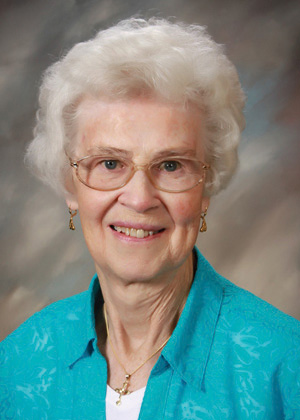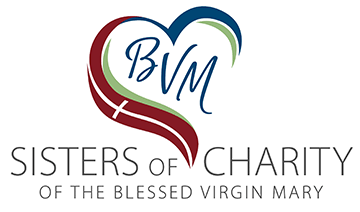Therese J. Jacobs, BVM (Therese Carmelle)

Therese J. Jacobs, BVM (Therese Carmelle) died Thursday, April 6, 2017, at Marian Hall in Dubuque, Iowa. Visitation will be from 9–11 a.m. on Wednesday, April 12, 2017, in the Marian Hall Chapel followed by a prayer service at 11 a.m. Funeral liturgy will be at 1:30 p.m. Burial is in the Mount Carmel cemetery.
She was born in Des Moines, Iowa, on May 9, 1929, to Harry Franklin and Mary Josephine Mullahey Jacobs. She entered the BVM congregation Sept. 8, 1947, from St. Mary Parish, Clinton, Iowa. She professed first vows on March 19, 1950, and final vows on Aug. 15, 1955.
Sister Therese taught music in elementary and secondary schools in Cascade and Davenport, Iowa; Kauai, Hawaii; Chicago and Mundelein, Ill; and St. Paul, Minn. She served as BVM regional in Davenport, and as formation director in Dubuque. She ministered on the college faculty and formation staff in Los Gatos, Calif. She served in pastoral ministry in Des Moines, Iowa; Jackson, Miss.; and Kumasi, Ghana.
She was preceded in death by her parents; brothers: Richard, Edwin, Bernard, Donald, Earl and John Paul; and sisters Mary Ellen Clark and Bernice Ann Iliff. She is survived by a brother, Francis J. Jacobs, St. Paul, Minn.; a brother-in-law, Stewart Iliff, Warrenton, Mo.; a sister-in-law, Marion Jacobs, Cedar Rapids, Iowa; nieces; nephews; and the Sisters of Charity, BVM, with whom she shared life for 69 years.
Sister Therese J. Jacobs, BVM (Therese Carmelle)
Funeral Welcome
Marian Hall, Wednesday April 12, 2017
Good afternoon and welcome to the celebration of life of our Sister Therese J Jacobs.
Therese Josephine Jacobs entered this world on May 9, 1929, in Des Moines, Iowa, as the daughter of Harry and Mary (Mullahey) Jacobs. Her father’s first wife died, leaving three sons. He later married Therese’s mother and together had four more boys and three girls. After Therese was born, the family moved to Clinton, Iowa. Although they lived in several residences, the family always belonged to St. Mary Parish, where Therese also attended school. Therese had a very active childhood filled with parish and school activities, piano lessons, Girls Scouts, hospital volunteering, and even gardening.
The main family recreation, however, was playing cards. Therese believed that she picked up her card sense by watching her parents play cards with another couple. The family also enjoyed following the vicissitudes of the Chicago Cubs. In her autobiography, she wrote, “We had very little material wealth, but were blessed with the presence and goodness [of our parents] . . . I was given the foundation of love and identity which have enabled me to establish healthy relationships and good friends.”
Therese entered the congregation on Sept. 8, 1947, received the name Therese Carmelle upon her reception on March 19, 1948, professed first vows on March 19, 1950, and lived 70 years as a BVM. On her profession day, Sister Clarice Hannaher, BVM gave Therese a medal of Thérèse of Lisieux with the following quote: “I want to love Jesus and to win Jesus’ love.” These words have motivated Therese to live a life full of gratitude and joy for all of God’s blessings.
Commenting about her 18 years of teaching music, Therese said, “I loved teaching elementary school music . . . Students loved a break from daily subjects so music was fun.” Therese was missioned in Iowa at St. Martin in Cascade and St. Paul in Davenport; in Hawaii at St. Catherine in Kauai; in Illinois at St. Gertrude in Chicago and Carmel Catholic HS in Mundelein; and in Minnesota at Our Lady of Peace in St. Paul. About her mission to Hawaii, Therese wrote, “[The] cultural diversity was a great richness in my life and gave me a breadth of understanding and experience that I have always treasured.”
Therese also served as a teacher and member of the formation team at Guadalupe College in Los Gatos, Calif., and as formation director at the Motherhouse. “It was a special gift to accompany women in their novitiate process of faith and deepened acceptance of themselves and God’s call and presence in their lives,” she commented. As a regional, Therese found herself involved with the sisters’ lives in very significant ways. “I was able to be a companion, elicit confidence and trust, and to be faithful to these women during stressful times as well as times of celebration.” Her experiences as formation director and regional coupled with encouragement from several friends helped Therese discern her next ministry.
In 1980, Therese earned a master’s degree in spiritual direction. “The studies were exciting . . . and energizing,” she wrote. “The real challenge came in owning my own strengths, personality and goodness and to believe in God’s fidelity and steadfastness even when I did not feel very faithful . . .” She subsequently served as a pastoral minister at Holy Trinity in Des Moines, and St. Richard in Jackson, Miss. While at Holy Trinity, she became a member of the Iowa Inter-Church Forum and served on the 1986 Iowa Pastor’s Conference planning committee. A friend from Holy Trinity wrote, “Let me acknowledge the important influence of [a] cherished BVM friend and mentor, Sister Therese Jacobs. We were on the RCIA team [together] . . . During this time I experienced a deep life-changing re-conversion . . . More than 30 years have passed and I value her support and friendship.”
During the summer of 1989, Therese traveled to the Centre of Spiritual Renewal in Kumasi, Ghana, where the faith of the people touched her deeply. “They are believers,” she wrote, “without God nothing would exist. I found their prayers full of praise, gratitude, dependence, trust, and joy—most of all, an attitude of praise and confidence.” She returned to Ghana in 2001 and spent the next nine years ministering there. A year after Therese left Ghana, a sign of her impact remained as the Easter liturgy was filled with a song she had taught the people.
For more than two decades, Therese enthusiastically encouraged the practice of centering prayer by training leaders and leading groups in Mississippi, Ghana and at Mount Carmel since her return to Dubuque. She led directed retreats and served as spiritual director to a countless number of individuals. “[My] ministries have allowed me into sacred places with others,” she commented. “My years were rich in seeing God’s action . . . and [the] power of healing and reconciliation in [people’s] lives. . . I know wherever I minister I will find God.”
In the area of social justice, Therese’s dedication and fearless initiative is evident in her numerous letters to newspapers and politicians in which she advocated for the disenfranchised and promoted the common good. She also was involved with Habitat for Humanity and visited women in correctional facilities. Therese was deeply honored to give the invocation before President Obama’s speech during his visit to Dubuque in 2012. “As I prepared the prayer I was very conscious of the desire to praise God for the gifts of life, freedom and faith.”
As a good listener with insight and keen sensitivity, Therese had the ability to relate easily and tenderly with others. Her gentle, kind spirit exuded warmth and wholeness. Someone recently commented, “She was a friend to everybody.”
In the Gospel, we hear Jesus say, “If you keep my commandments, you will remain in my love, just as I have kept my Father’s commandments and remain in his love.” Our deceased Sister Margaret O’Shea once complimented Therese, saying that she helped her realize that it is possible to carry out the Gospel and love everyone.
Therese has asked to be remembered as “a deeply spiritual woman, extremely grateful for a consistent sense of God’s personal care for her, for the riches of family, community and friends and for the wonder and beauty of creation.”
Truly, she was a gift to us all.
